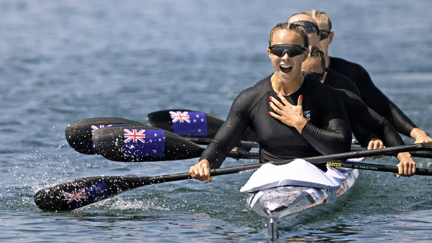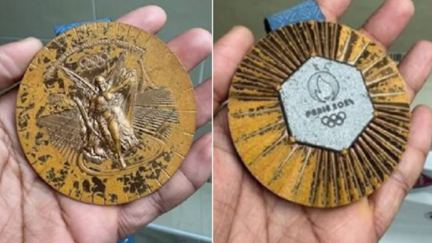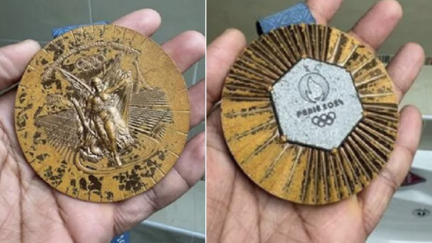📰 Olympic Games athletes to get 220,000 condoms and ‘anti-sex’ beds in Paris
- Publish date
- Sunday, 19 May 2024, 9:24AM
Olympic athletes will sleep on cardboard frames that have been dubbed “anti-sex” beds at this year’s Paris games.
Games organisers say the cardboard beds – which were first used in Tokyo in 2021 – are returning to action, because the material will be cooler to sleep on during hot Parisian nights and it prioritises sustainability.
The beds are reportedly able to hold up to 250kg, and the frames and mattresses are recyclable.
“I hope that Paris 2024′s efforts to reduce its impact will show that it is possible to do things differently,” Georgina Grenon, director of environmental excellence for the organising committee, said in a statement.
Similar beds, made by Airweave, were used at the Tokyo Games, where an “intimacy ban” was introduced to prevent the spread of Covid-19. Athletes at the time dubbed the frames “anti-sex” as it was thought they would collapse under vigorous motion.
Sky News in Britain said the cardboard beds were “sturdy enough, apparently, to support 250kg of Olympian – or Olympians”.
The 10,500 athletes in Paris will have access to 220,000 condoms at the Games, about 21 for each competitor. That’s more than one a day over the 16-day duration of the Games running from July 26 to August 11.
“It is very important that the conviviality here is something big,” Olympic Village director Laurent Michaud told Sky News.
The Olympic condom count was first reported at the 1988 Olympics in Seoul, when 8500 contraceptives were made available for athletes. It reportedly increased to 15,000 at the Atlanta Games.
At the Barcelona Olympics in 1992, 90,000 condoms were made available for athletes (according to the Associated Press). At the Sydney Games in 2000, 70,000 condoms were provided – but a further 20,000 were rushed in by supplier Ansell as stocks ran low. “Judging by the demand, the medal tally is certainly rising both in and out of the sporting arena,” an Ansell spokesperson said.
Four years later in Athens, there were 130,000 prophylactics available and 30,000 lubricant packets (according to Reuters).
Beijing in 2008 offered a more conservative 100,000 condoms, with 150,000 in play for London in 2012.
Olympic condom supplies peaked in 2016 at Rio de Janeiro, when 450,000 condoms were in circulation at the Olympic Village.
For the intimacy-hampered Tokyo Games, 160,000 condoms were handed out, with organisers gamely suggesting athletes could take them home as souvenirs.
Olympic sex stories have long circulated around the event. Author Matthew Syed, who represented Great Britain at table tennis in Barcelona, told Britain’s Times newspaper he “got laid more often in those two-and-a-half weeks than in the rest of my life”.
Former United States footballer and two-time gold medallist Hope Solo said she saw athletes having sex on the ground at the London Olympics. “I’ve seen people having sex right out in the open,” Solo said. “On the grass, between buildings, people are getting down and dirty.”
This article was first published on nzherald.co.nz and is republished here with permission
Take your Radio, Podcasts and Music with you




